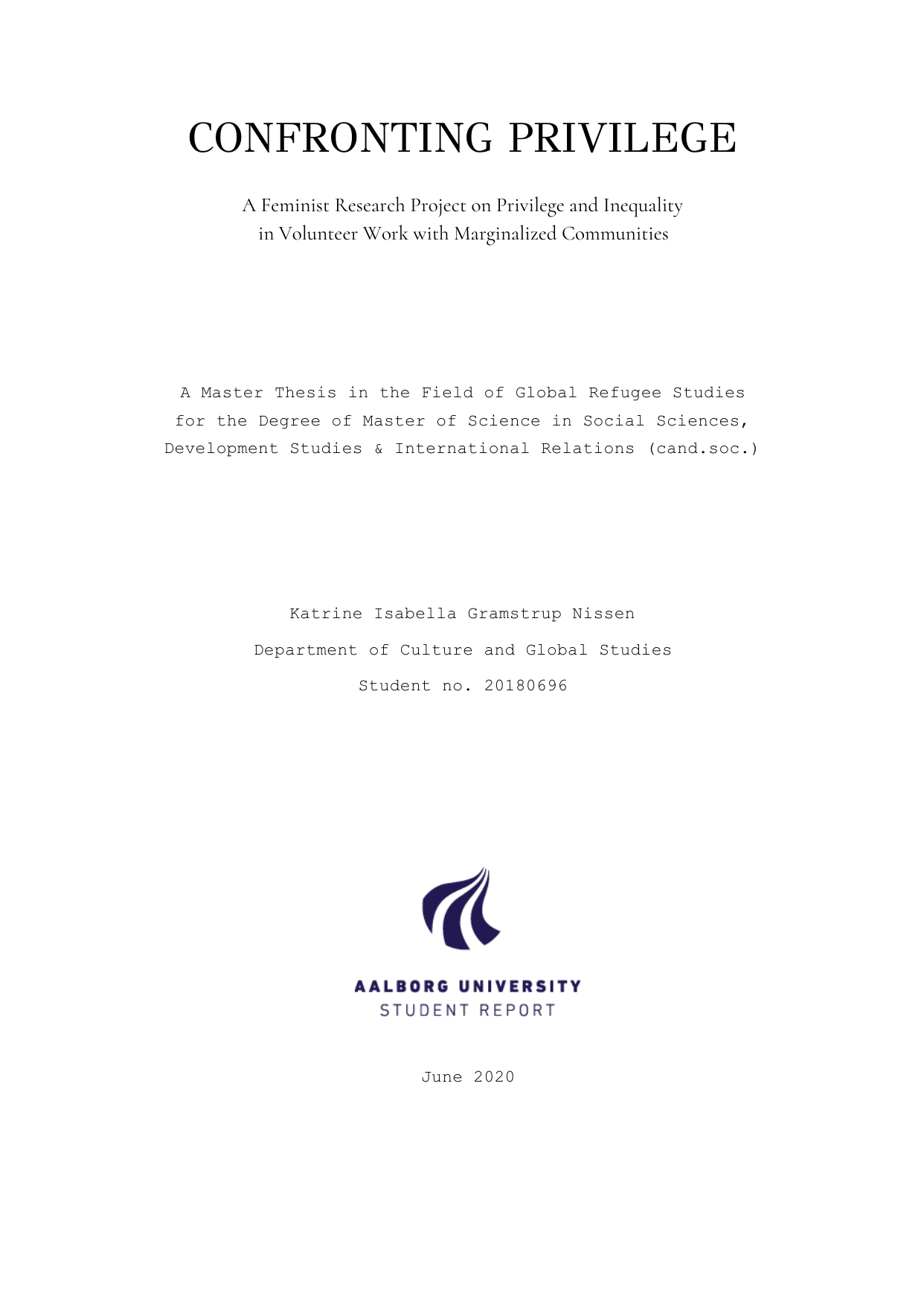
Confronting Privilege: A Feminist Research Project on Privilege and Inequality in Volunteer Work with Marginalized Communities
Term
4. term
Education
Publication year
2020
Submitted on
2020-05-28
Pages
39
Abstract
This master thesis project investigates how privilege and inequality is experienced, reproduced and resisted by volunteers in the Danish NGO/community center for refugees and asylum seekers, Trampoline House. On the basis of an overall theoretical framework composed firstly of theories of critical race studies provided mainly by Ruth Frankenberg, Peggy McIntosh, Kimberlé Crenshaw and Audre Lorde and secondly by structuration theory as presented by Anthony Giddens, this thesis analyzes the social narratives of eight current or former volunteers from Trampoline House on the grounds of three online focus group discussions. Critical race theory has been pivotal in understanding and analyzing narratives of privilege and inequality, and structuration theory has provided the optimal framework for conducting this analysis. As I align myself with Giddens in the greater structure/agency debate, I understand structures as both limiting and enabling, meaning that the narratives of the volunteers can be both constrained reproductions of already existing structures of power, as well as modes of resistance to the structures. In fully comprehending the structurations of privilege as narrated by the volunteers, I have divided the analysis in two parts. The first part of the analysis focuses on the narratives of the volunteers, exploring how they understand privilege and experience inequality in the volunteer context. In the second part of the analysis, I elevate the analysis and unfold the structures surrounding and dictating the narratives of the volunteers, as the answer to how the volunteers resist and reproduce structures are to be found also in the structural contexts of Trampoline House and the wider society. In investigating structures of privilege and inequality, the analysis additionally engages in a larger analytical discussion on how it is possible to work responsibly with privilege in marginalized communities. In conclusion, it is demonstrated that the volunteers are unsuccessful in resisting the current structures as they experience them, despite an awareness on issues of privilege and inequality. Because the volunteers are shaped by the very privilege they speak of, they are taught not to recognize it in themselves, and as a result they push away the responsibility of creating change. It is additionally concluded that the pivotal first step towards resisting the current structures is to acknowledge how Trampoline House as an organization is complicit in the current structurations of privilege, which is informed and shaped by imperialism. On the grounds of this analysis, I argue for an examination of the construction of privilege in Trampoline House in order to work responsibly with structures of privilege and inequality in the meeting between volunteers and refugees
This master thesis project investigates how privilege and inequality is experienced, reproduced and resisted by volunteers in the Danish NGO/community center for refugees and asylum seekers, Trampoline House. On the basis of an overall theoretical framework composed firstly of theories of critical race studies provided mainly by Ruth Frankenberg, Peggy McIntosh, Kimberlé Crenshaw and Audre Lorde and secondly by structuration theory as presented by Anthony Giddens, this thesis analyzes the social narratives of eight current or former volunteers from Trampoline House on the grounds of three online focus group discussions. Critical race theory has been pivotal in understanding and analyzing narratives of privilege and inequality, and structuration theory has provided the optimal framework for conducting this analysis. As I align myself with Giddens in the greater structure/agency debate, I understand structures as both limiting and enabling, meaning that the narratives of the volunteers can be both constrained reproductions of already existing structures of power, as well as modes of resistance to the structures. In fully comprehending the structurations of privilege as narrated by the volunteers, I have divided the analysis in two parts. The first part of the analysis focuses on the narratives of the volunteers, exploring how they understand privilege and experience inequality in the volunteer context. In the second part of the analysis, I elevate the analysis and unfold the structures surrounding and dictating the narratives of the volunteers, as the answer to how the volunteers resist and reproduce structures are to be found also in the structural contexts of Trampoline House and the wider society. In investigating structures of privilege and inequality, the analysis additionally engages in a larger analytical discussion on how it is possible to work responsibly with privilege in marginalized communities. In conclusion, it is demonstrated that the volunteers are unsuccessful in resisting the current structures as they experience them, despite an awareness on issues of privilege and inequality. Because the volunteers are shaped by the very privilege they speak of, they are taught not to recognize it in themselves, and as a result they push away the responsibility of creating change. It is additionally concluded that the pivotal first step towards resisting the current structures is to acknowledge how Trampoline House as an organization is complicit in the current structurations of privilege, which is informed and shaped by imperialism. On the grounds of this analysis, I argue for an examination of the construction of privilege in Trampoline House in order to work responsibly with structures of privilege and inequality in the meeting between volunteers and refugees
Keywords
Documents
